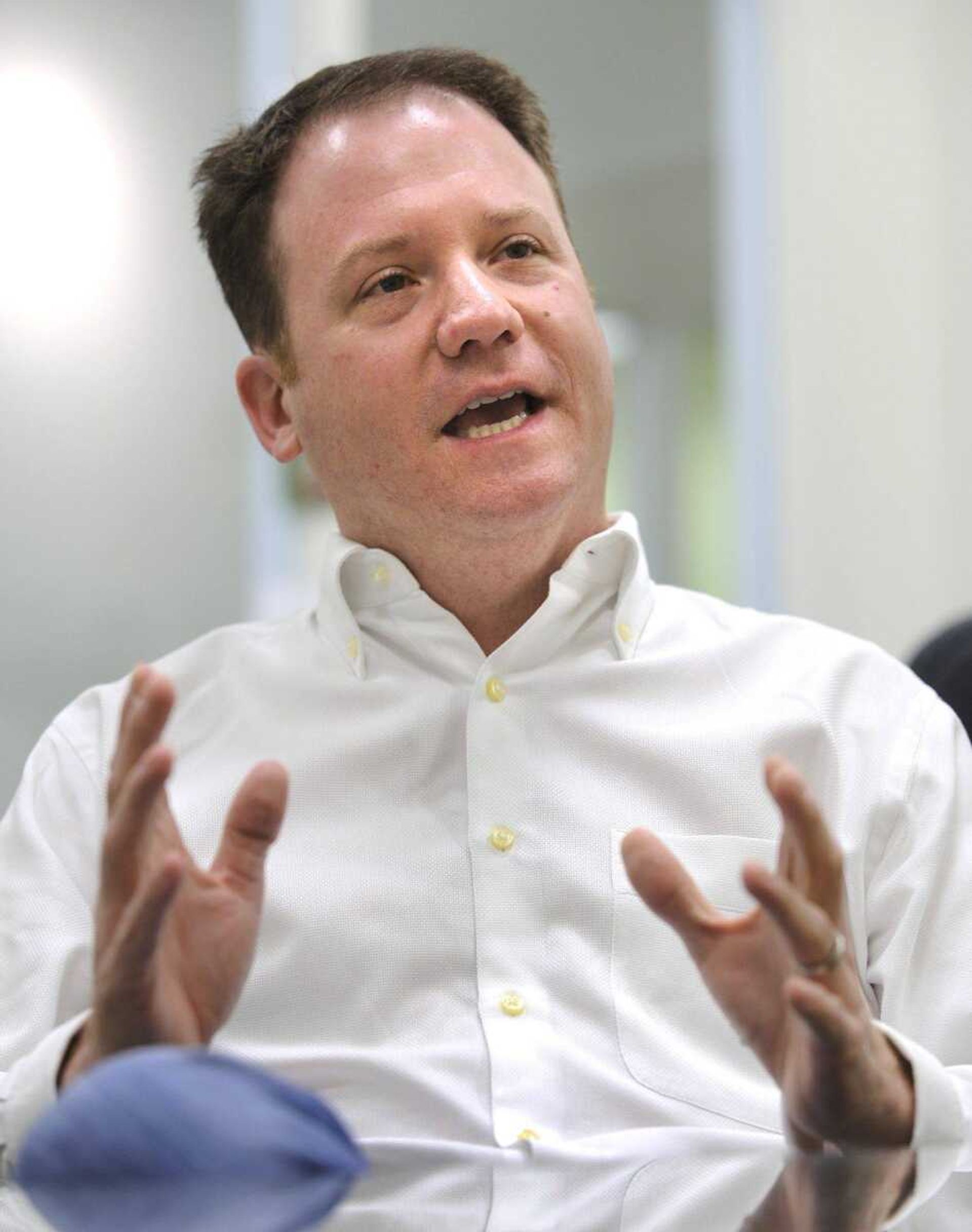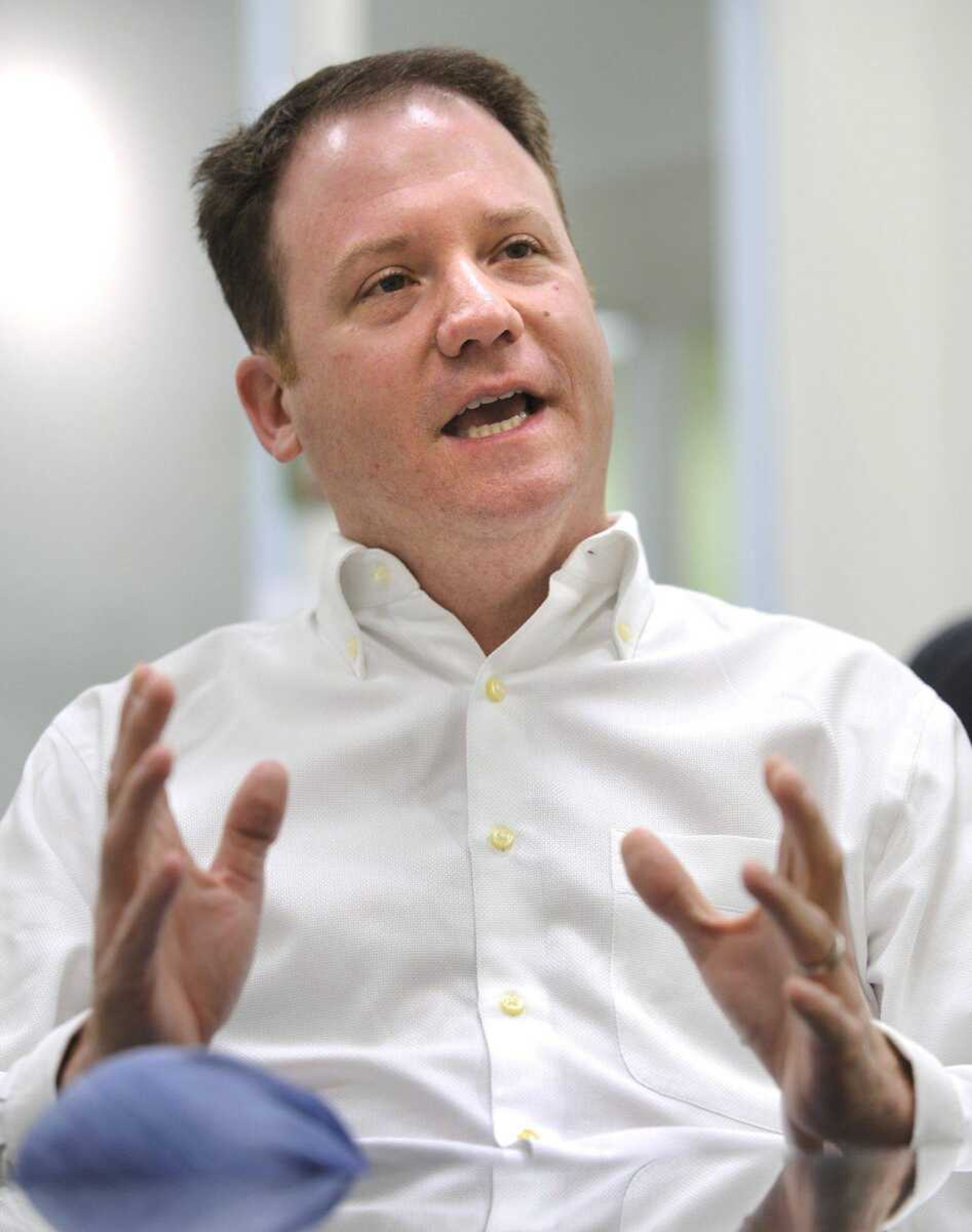'Force of nature': Jason Crowell ends 12 years of sometimes controversial leadership
For most politicians, Sen. Jason Crowell believes that one goal trumps all others -- and it has nothing to do with anything that's being hotly debated by any elected body in the country. If you're like most politicians, as Crowell sees it, it's all window dressing. Democrat or Republican, mayor or president, Crowell says the thing that most politicians really want, above all else, is to get re-elected...
For most politicians, Sen. Jason Crowell believes that one goal trumps all others -- and it has nothing to do with anything that's being hotly debated by any elected body in the country.
If you're like most politicians, as Crowell sees it, it's all window dressing. Democrat or Republican, mayor or president, Crowell says the thing that most politicians really want, above all else, is to get re-elected.
And as Crowell winds down a 12-year political career as a Missouri lawmaker, he says that was one trap that he was able to dodge, an enticement that never interested him. He never, he says, looked to a political future that extended beyond the next election or to any position that voters had most recently selected him for.
"I never really cared about all that," Crowell said. "I never set out to be a career politician. I never thought I had promised to me a future that was more than the term I was in."
Across a political career that began in 2000 in the Missouri House of Representatives and ends this year in the Missouri Senate, Crowell says that attitude has afforded him the luxury of acting on his guiding principle, not on appeasing the power structures that help others win re-election.

"Every person is going to have to make a decision at some point," Crowell said. "Are they going to do what they think is the right thing to do or what others think is the right thing to do? My goal was always to make the community a better place than I found it, instead of worrying about the next election."
What Crowell describes as a career of principled stances isn't universally accepted. Not everyone who has come across Crowell, or been the victim of his political barbs, affixes such high-minded motives to his actions. Some have accused the outgoing senator, who cannot seek re-election because of term limits, of using his influence to enact personal vendettas or to retaliate petty feuds.
At best, even his friends describe Crowell as someone who is willing to do whatever it takes -- within the rules -- to advance his cause.
"I have never seen anybody willing to burn political capital and make enemies the way that he was to advance an agenda," said former Missouri House speaker Rod Jetton, one of Crowell's friends. "There's nobody like Jason. I've never seen anybody like Crowell. I love him to death, but he's a force of nature."
At 28 years old, the young lawyer no doubt seemed a young replacement for Rep. Mary Kasten, who had held the post that served Cape Girardeau in the General Assembly for 18 years. No one, Crowell recalls, who represented Cape Girardeau in the legislature had ever been that young.
Mayor Al Spradling III, who was Cape Girardeau mayor at the time, came out publicly in support of Crowell, perhaps because of his youthful enthusiasm.
"I thought he was an up-and-coming young politician who had some good ideas," Spradling said. "I thought he would represent the district extremely well. Of course, we did have our differences after I got on the university's board of regents."
Still, as Crowell went to Jefferson City, he says now, he probably wasn't as naive as perhaps some of the older freshmen legislators were.
"I came at the job in a very unique situation," Crowell said. "I had seen a lot more than a 28-year-old punk kid would have seen. I had an understanding."
Crowell intended to bring that mindset to the state capitol, he recalls now, and to read every bill and to understand every legislative tool at his disposal. It was a similar practice that he had honed in his education, especially in law school, as he struggled to overcome Dyslexia.
Jetton, who was among that freshman class with Crowell, was assigned a seat next to Crowell and he recalls how prepared Crowell was. Jetton didn't at first think the two would become friends -- he thought they might become competitors for the state senate seat then occupied by Peter Kinder.
"But I was never the detailed legislative guy," Jetton said. "I was the campaign guy, he was the issue guy. He had his legislative book that was so well put together and organized. I was having my secretary do it, but I decided to just start looking over at his book. I think it kind of upset him at first. But it turns out that we became friends. We were a good team. We had different skill sets."
It was a friendship that eventually came under scrutiny. Crowell took some heat for hiring Jetton as a consultant. Later, when Jetton was arrested in the sexual assault of a woman, after he left the legislature, Jetton said he knew he had let his friend down.
"I know Jason was probably not happy with some of my choices and was upset with me for making them," Jetton said. "But he never deserted me as a friend."
Jetton said that, as a debater, Crowell was unmatched. Crowell won re-election to the House in 2002 as part of the new Republican majority. He served the chamber as majority floor leader, a job that allowed him to set the agenda and the bill order for floor debate. Crowell's friend Jetton, still years from his troubles, became speaker pro tem under House Speaker Catherine Hanaway.
Crowell and his colleagues were able to address issues important to Republicans. But when Sen. Peter Kinder announced he would run for lieutenant governor, Crowell decided to jump ship after two terms in the House.
And, as he did in his every attempt at re-election, Crowell won.
It was in the more influential Senate that Crowell in earnest began to use parliamentary procedural rules to his advantage.
"I learned early on that you did not have to be a part of leadership to influence public policy," Crowell said. "More importantly, I didn't have to get caught up in getting the bill you sponsored passed. Who cares if it was an amendment as long as it's implementing the policy we cared about?"
While the House had procedures to make filibustering impossible, no such rules exist in the Senate. And it was in this setting that Crowell shined -- as long as you agreed with him and didn't stand in his way.
"He didn't care if he made you mad or not," Jetton said. "If he had to smack you down to beat you, he would. But he was definitely taking principled stands. He didn't like [university president] Ken Dobbins, but it wasn't about Ken Dobbins. He just thought Ken Dobbins was wrong. But he wouldn't lose any sleep because it was going to make Ken Dobbins mad."
In the Senate, Crowell eventually joined and became leader of a group of nine fiscally conservative Republican senators who could stall debate on almost any subject. This year alone, the group cut off debate on Missouri's proposed budget. Crowell himself vowed to hold up veterans legislation -- and any other issue brought to the senate floor -- until his concerns over other budgetary issues were addressed.
Crowell was instrumental in helping secure funding for an autism center at Southeast Missouri State University. He also helped lobby for funding that would keep the doors open at Cottonwood Children's Residential Treatment Center. He broke with his party to restore cuts in Medicaid. Crowell also took credit for the fact that the university pledged to not issue bonds without a funding stream.
But Crowell also became more critical of Southeast Missouri State University. He took Dobbins to task in 2005 for building its River Campus arts school without, as he put it, "having a dedicated funding stream to pay for it." Crowell remained critical of the university for the duration of his time in the legislature.
This year, he took some heat for disagreeing about whether the university should receive a $2 million funding increase, which had some scratching their heads about why a sitting senator would seemingly lobby against funding for a university in his district.
He argued that the $2 million earmark should be divided among the other schools and took some area legislators to task for voting for Speaker Steve Tilley's plan, including the man who voters selected to replace him, Rep. Wayne Wallingford. Not every child of his constituents chose to go to Southeast, Crowell pointed out.
Both of those positions were political stances that were based on principle, Crowell said. Some speculated that there was bad blood between Dobbins and Crowell.
"I don't care who the university president is," Crowell said. "I care about the public policy. They could put my brother in as president of the university and he made these decisions, I would have been equally critical and equally so in public."
Spradling, the former member of the board of regents, stressed that Crowell did good things for the district. But he said he found Crowell's actions hard to understand.
"Mr. Crowell, in my opinion, was being a little petty in beating up the university and spreading the money around," Spradling said. "Historically, Southeast has been the doormat of getting funding that has gone elsewhere. ... I don't know all of his reasons. I don't know if they were personal or not. I was a little disappointed in what he was trying to do."
Crowell shrugs off such displays of disappointment from others. He says he, and many of his constituents, know what his motivation has been.
"I can't worry about what others think," he said. "I can't do that and do what the people sent me to Jefferson City to do."
Now, as Crowell prepares to fade into the sunset, he insists that he's not worried about his legacy. It was never about him, he said. He also said he has no intention of seeking another political office. Recently married and back from a trip to Italy, he said -- as he has often since his nuptials -- his job now is to be husband of the year. One of his last political moves, if he does indeed retire from public life, was to endorse Rep. Wayne Wallingford as his replacement in the Senate race. Wallingford won.
"I'm not the senator anymore," Crowell said. "You won't hear from me anymore. I'm not hanging onto it, either. I am not defined by a title that was placed on the front of my name for a short period of time. That's not who I am. That's not what I am."
smoyers@semissourian.com
388-3642
Pertinent address:
Jefferson City, MO
Connect with the Southeast Missourian Newsroom:
For corrections to this story or other insights for the editor, click here. To submit a letter to the editor, click here. To learn about the Southeast Missourian’s AI Policy, click here.










